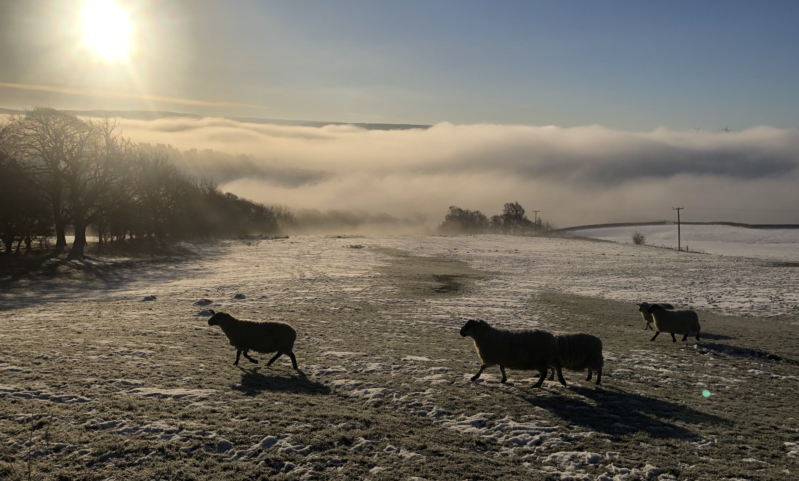Research project
Constrained Rural Entrepreneurship
- Start date: 1 January 2023
- End date: 31 December 2028
- Principal investigator: Dr Peter Gittins
- Co-investigators: Dr Deema Refai
- Research assistant: Mattia Dessi

Description
This research focuses on entrepreneurship in constrained contexts, specifically examining the constraints and challenges faced by farm entrepreneurs.
The project delves into the constraints and challenges encountered by upland farmers in navigating increasing legislative and societal pressures to achieve Net-Zero goals.
Other projects investigate farm entrepreneurship in international settings. Ongoing interests include studying the constraints and challenges faced by commercial farmers in South Africa, exploring how farmers can employ farm diversification strategies in rural Greece to address challenges in the sector, and examining the constrained agricultural contexts in Jordan. In the latter, we investigate how rural entrepreneurs, through the adoption of social innovations, can overcome challenges in the industry.
This research project is funded by Leeds University Business School’s Impact and Engagement Support Fund and International Research Collaborations Fund.
Key issues being investigated:
- What are the constraints and challenges facing farmers in relation to increasing legislative and societal pressures to meet Net-Zero?
- How will Net-Zero and other environmental policy ambitions shape the agricultural sector, economically, socially, and environmentally?
- What role does rural entrepreneurship have in helping farmers respond to the increasing industry constraints?
Investigating these questions is crucial in the pursuit of sustainable development goals. By understanding the constraints and challenges farmers face in meeting Net-Zero targets, we can develop targeted interventions and policies that facilitate a smoother transition towards environmentally conscious farming practices. Moreover, comprehending the broader implications of Net-Zero and related environmental policies on the agricultural sector allows for informed decision-making in economic, social, and environmental dimensions. Lastly, recognising the pivotal role of rural entrepreneurship in navigating industry constraints empowers farmers to adopt innovative strategies, fostering resilience and sustainability within the agricultural community. This research aims to contribute valuable insights towards achieving a more sustainable and resilient agricultural sector in alignment with global development objectives.
Key findings
Post-Brexit policy is having a dramatic effect on the UK farm sector. There is significant uncertainty in the UK farming sector. Different types of farmers will pursue various strategic options. The increasing regulation accompanying environmental policies poses a key constraint to many farming businesses. Environmental Land Management Schemes (ELMs) must be inclusive of the diverse nature of farming practices; otherwise, farmers may pursue alternative options, which could lead to outcomes contrary to the UK government's environmental objectives.
Impact
Ongoing impact activities:
- Creation of a policy document and brief that informs rural policymakers on how upland farmers are adapting to post-Brexit agriculture.
- Policy recommendations: Recommendations to make ELMs more inclusive for hill and upland farmers, recognizing diverse types of farmers and farm business practices.
- A call for payment options under the Sustainable Farming Incentive to reward farmers for enhancing beauty, heritage, and engagement with the natural environment.
- Brought together key actors in the food, farming, and countryside areas through workshop activities to discuss industry issues. This industry is fragmented, and these actors often operate in silos.
Publications and outputs
Project report:
- “Challenges and entrepreneurial opportunities for hill and upland farmers post-Brexit” Farming stakeholder report, July 2024
Journal articles:
- Gittins, P. and McElwee, G., 2023. Constrained rural entrepreneurship: Upland farmer responses to the socio-political challenges in England's beef and sheep sector. Journal of Rural Studies, 104, p.103141.
- Gittins, P., McElwee, G. and Lever, J., 2022. Constrained entrepreneurship in UK agriculture: A Weberian analysis. Journal of Rural Studies, 95, pp.495-504.
- Gittins, P. and Morland, L., 2021. Is ‘Growing Better’ripe for development? Creating an urban farm for social impact. The International Journal of Entrepreneurship and Innovation, 22(4), pp.266-274.
- Gittins, P., McElwee, G. and Tipi, N., 2020. Discrete event simulation in livestock management. Journal of Rural Studies, 78, pp.387-398.
Media coverage and blog posts:
- “Agriculture: ce nouvel impôt qui enflamme la paisible campagne anglaise” / “Agriculture: a new tax that ignites the peaceful English countryside”, Les Echos (daily business and finance French newspaper), November 2024
- “Changes to agricultural relief: another nail in the coffin for UK agriculture”, Yorkshire Bylines, November 2024
- ‘I might as well stop and diversify into holiday lets’ – new research reveals the reality of farming after Brexit, The Conversation, April 2024
- “Barriers to sustainability: reflecting on food, farming and countryside at the Leeds University research farm”, Yorkshire Bylines, September 2023
- “Supporting UK farmers towards net-zero agriculture”, Yorkshire Bylines, August 2023
- “Constrained rural entrepreneurship in South Africa: A tale of two agricultures”, Research and Innovation, August 2023
- “The rural cost-of-living crisis”, Yorkshire Bylines, March 2023
- “British farmers are being offered a lump sum payment to leave the industry – but at what cost to agriculture?”, The Conversation, June 2022
Podcasts:
- The Why Curve – Tractors in Whitehall, November 2024
- Research and Innovation Podcast, November 2023
<iframe width="100%" height="166" scrolling="no" frameborder="no" allow="autoplay" src="https://w.soundcloud.com/player/?url=https%3A//api.soundcloud.com/tracks/1687557153&color=%23ff5500&auto_play=false&hide_related=false&show_comments=true&show_user=true&show_reposts=false&show_teaser=true"></iframe><div style="font-size: 10px; color: #cccccc;line-break: anywhere;word-break: normal;overflow: hidden;white-space: nowrap;text-overflow: ellipsis; font-family: Interstate,Lucida Grande,Lucida Sans Unicode,Lucida Sans,Garuda,Verdana,Tahoma,sans-serif;font-weight: 100;"><a href="https://soundcloud.com/leedsunibschool" title="Leeds University Business School" target="_blank" style="color: #cccccc; text-decoration: none;">Leeds University Business School</a> · <a href="https://soundcloud.com/leedsunibschool/examining-constrained-rural-entrepreneurship-how-farmers-are-adapting-post-brexit" title="Examining constrained rural entrepreneurship – how farmers are adapting post-Brexit" target="_blank" style="color: #cccccc; text-decoration: none;">Examining constrained rural entrepreneurship – how farmers are adapting post-Brexit</a></div>
Events:
- The 21st Rural Entrepreneurship Conference - hosted by Leeds University Business School in June 2024.
- Food, Farming and Countryside: Entrepreneurial Opportunities and Challenges – the team hosted a two-day hybrid event in September 2023 at Leeds University Research Farm which was attended by an academic, practitioner, and policy-focused audience.

